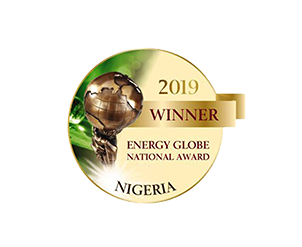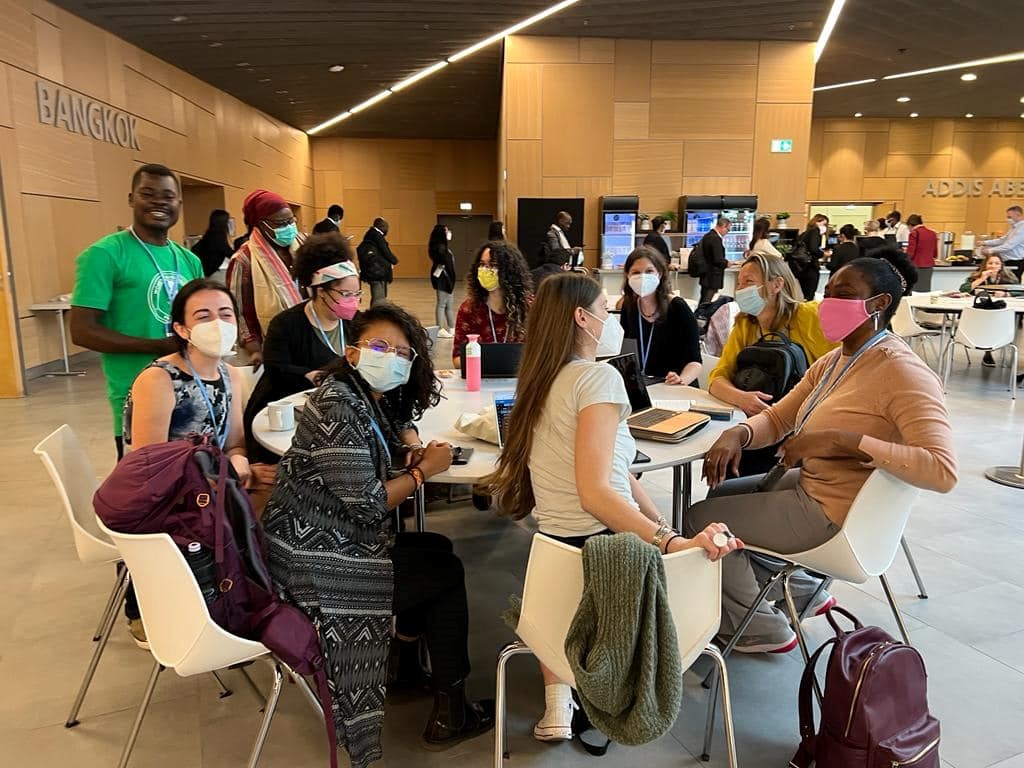
WEP’s Participation at SBI56
Women Environmental Programme (WEP) participated at the Bonn Climate Change Conference (The 56th session of the Subsidiary Body for Implementation (SBI) that took place in Bonn, Germany from 6-16 June 2022.
SBI56 was a preparatory meeting on issues that would be discussed at the 27th session of the Conference of Parties (COP27) to the United Nations Framework Convention on Climate Change(UNFCCC) in Egypt. This meeting was important as this was where the agenda for COP27 was drawn.
WEP joined the Women and Gender Constituency to follow and make inputs into discussions bordering on loss and damage, gender and climate change, and climate finance among others.
Our goal was to ensure that the outcome of the Bonn Climate Change Conference which will form part of the discussions at COP27 in Egypt was pro-poor, just and inclusive.
Three members of the WEP team participated at the Bonn Climate Change Conference: Dr Priscilla Achakpa, WEP’s Founder and Global President; Anne-Marie Abaagu, WEP’s Executive Director; John Baaki, WEP’s Deputy Executive Director. Each of the team members followed up on particular discussions at the conference at a time. The issues followed by WEP team at the conference were: Climate Finance, Loss and Damage, Gender and Climate Change.
COLLABORATION AS ENGAGEMENT STRATEGY AT SBI56
To effectively engage the issues that were been discussed at SBI56 and make inputs to them, WEP collaborated with different groups at the conference to work together and make their voices louder. These groups were groups of civil society organizations or women groups who engaged the same issues as WEP at the conference. The groups that WEP collaborated to engage and host events at the SBI56 were: Women and Gender Constituency (WGC), Pan African Climate Justice Alliance (PACJA), African Working Group on Gender and Climate Change (AWGGCC) and other individual civil society and women’s organizations. The engagements with these groups included: strategy meetings to review negotiation documents, plan on how to engage the parties to include our position on some issues that were discussed; drafting of position papers; informal meetings with negotiators; press conferences and side events to highlight the position of the groups on issues that were been discussed; articles and opinion pieces to project the demands of the groups, and capacity building workshops.
HIGHLIGHTS OF WEP’S PARTICIPATION AND CONTRIBUTIONS AT THE CONFERENCE
Apart from several other meetings which staff of WEP participated in to follow discussions on issues that were of interest to WEP, here are some of the specific events that WEP organized, participated, and contributed to:
Strategy meetings
- Women and Gender Constituency daily strategy meetings: From 6-16 June 2022 during the SBI56, members of the Women and Gender Constituency met every morning from 9am -10am CEST to plan on how to follow events and take updates on what happened the previous day. As a member of Women and Gender Constituency, staff of WEP participated in the constituency’s daily strategy meetings between 6-15 of June 2022 before departing for Nigeria on the 16th The daily strategy meetings took place in Room Bangkok inside the World Conference Center Bonn. Everyday, members of the constituency were assigned to monitor negotiations, hold meetings or carry out some tasks and report back to the constituency the next day. Some of the tasks of the Women and Gender Constituency that our staff were involved were:
- Drafting of African Women’s Demands for COP27 – Dr Priscilla Achakpa led this team in drafting the demands
- Women and Gender Constituency Side Event – John Baaki of WEP was involved in the planning of the side event as can be seen in this planning document.
- Action on spotting G in the GST (Global Stock Take) – Anne-Marie Abaagu participated in this action.
- Following negotiations – John Baaki, Anne-Marie and Dr Priscilla Achakpa followed negotiations on Loss and Damage, Climate Finance, Gender and Climate Change and provided regular update during strategy meetings.
- Strategy meeting with PACJA:
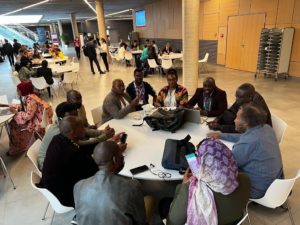 WEP as a member of PACJA also engaged with other members of PACJA at SBI56 to advocate for issues that were of priority for Africa to be considered in the negotiations. Some of the priority issues for PACJA were: Loss and Damage, Adaptation and Finance. On the 9th of June 2022, WEP joined the strategy meeting organized by PACJA to plan for a press briefing where the expectations of PACJA from the negotiations would be articulated. This was followed up with several other strategy meeting between the planning team and the speakers which Dr Priscilla Achakpa was one of them. PACJA also planned and held meetings with negotiators where PACJA’s expectations were discussed with the negotiators.
WEP as a member of PACJA also engaged with other members of PACJA at SBI56 to advocate for issues that were of priority for Africa to be considered in the negotiations. Some of the priority issues for PACJA were: Loss and Damage, Adaptation and Finance. On the 9th of June 2022, WEP joined the strategy meeting organized by PACJA to plan for a press briefing where the expectations of PACJA from the negotiations would be articulated. This was followed up with several other strategy meeting between the planning team and the speakers which Dr Priscilla Achakpa was one of them. PACJA also planned and held meetings with negotiators where PACJA’s expectations were discussed with the negotiators.
- Strategy meeting of the African Working Group on Gender and Climate Change:
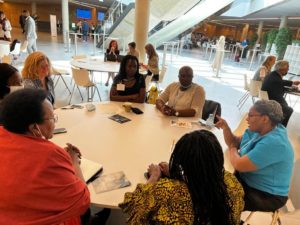 Members of the African Working Group on Gender and Climate Change which WEP is a member had strategic meetings and engagements with negotiators during SBI56 in Bonn. Members of the group had a meeting on 14th June 2022 in Bonn to strategize on how to engage the COP27 process. The AWGGCC engaged the Chair of the African Group of Negotiators (AGN) and introduced the AWGGCC to the Chair while in Bonn. The essence was for AWGGCC to serve as a think tank to the African Group of Negotiators on gender matters. The AGN Chair welcomed this proposal but suggested that the AGN will have further discussions with the AWGGCC to take this discussion forward.
Members of the African Working Group on Gender and Climate Change which WEP is a member had strategic meetings and engagements with negotiators during SBI56 in Bonn. Members of the group had a meeting on 14th June 2022 in Bonn to strategize on how to engage the COP27 process. The AWGGCC engaged the Chair of the African Group of Negotiators (AGN) and introduced the AWGGCC to the Chair while in Bonn. The essence was for AWGGCC to serve as a think tank to the African Group of Negotiators on gender matters. The AGN Chair welcomed this proposal but suggested that the AGN will have further discussions with the AWGGCC to take this discussion forward.
Side events
- African Feminist Demands for COP27:
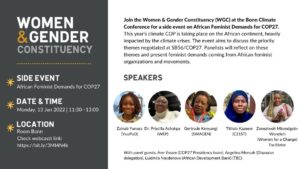 WEP in collaboration with Women and Gender Constituency organized a side event on the 13th of June 2022 titled: “African Feminist Demands for COP27.” This side event was held in Room Bonn between 11:30 – 13:00 and had in attendance civil society organizations, media, parties, representative of UN agencies, women’s groups, academia and researchers. The side event was used as a platform to present the demands of the African women for COP27. The following speakers analyzed the demands presented at the side event: Zainab Yunusa (Young Professionals in Policy and Development), Dr Priscilla Achakpa (Women Environmental Programme), Gertrude Kenyangi (SWAGEN), Titilola Kazeem (Center for 21st Century Issues), and Zoneziwoh Mbondgulo-Wondieh (Women for a Change).
WEP in collaboration with Women and Gender Constituency organized a side event on the 13th of June 2022 titled: “African Feminist Demands for COP27.” This side event was held in Room Bonn between 11:30 – 13:00 and had in attendance civil society organizations, media, parties, representative of UN agencies, women’s groups, academia and researchers. The side event was used as a platform to present the demands of the African women for COP27. The following speakers analyzed the demands presented at the side event: Zainab Yunusa (Young Professionals in Policy and Development), Dr Priscilla Achakpa (Women Environmental Programme), Gertrude Kenyangi (SWAGEN), Titilola Kazeem (Center for 21st Century Issues), and Zoneziwoh Mbondgulo-Wondieh (Women for a Change).
The following were the demands of the African Feminist for COP27 presented during the side event:
- Inclusion of women and young people as national delegates to engage meaningfully in the UNFCCC COP & SBs decision-making processes
- Targeted multi-dimensional approach to support the poorest and most vulnerable African communities through investments in clean energy at large scale to create jobs, raise GDP and cut greenhouse gas emissions
- Provision of adequate, accessible, and human rights centered climate finance as a matter of justice and equity.
- Expanded women’s access to, control of and decision-making regarding land ownership,
- productive resources and flexible funding for enhanced agricultural production and food security. Investment in small-scale agro-ecology (fishery, animal husbandry) and associated coastal communities in integrated management and food sovereignty, and protection of access rights for women-led, small-scale, and artisanal fisheries in a climate-changing world.
- Development of national climate learning strategies that are gender transformative
- Recognize the importance of youth leadership by prioritizing civic engagement, green skills, rights, life skills, policy processes and activism, and ensure that girls and young women are meaningfully engaged in the development of these strategies
- Technological developments related to climate change should incorporate and enhance indigenous and women’s specific knowledge, priorities, needs and roles in the development of new technologies ranging from accessibility, user-friendliness, affordability, effectiveness, and sustainability.
- Developed countries must commit to immediately halt all new investments in fossil fuels and nuclear energy, with a clear and urgent phase out/ shift from a fossil-fuel based economy to an economy based on genuine sustainable and gender-responsive use of renewable energies.
View the video recording of the side event here.
- High stakes, great urgency – collecting evidence for gender-just and impactful climate policies: On 14th June 2022 in Room Bonn, from 11am – 1:00 CEST, Women Environmental Programme (WEP) in collaboration with Women Engage for a Common Future and CGIAR hosted a side event to showcase gender-just and impactful climate policies. The aim of the side event was to present works done by women’s and gender organizations that were considered to be gender-just that could be adopted by different stakeholders in addressing the climate change crisis.
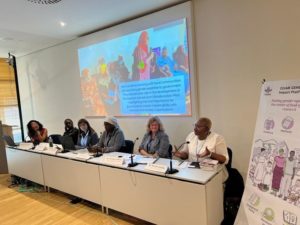 Speakers at the event were: Agnes Merimbe of ARUWE Uganda, Victoria Bojaca of ENDA Colombia, Fatou Ndoye of ENDA Graf Sahel, Dr Nicoline De Haan of CGIAR, Dr Priscilla Achakpa of WEP Nigeria and the representative of Egypt COP27 Presidency. Taking turns, each speaker spoke about a specific climate change initiative that has targeted and involved vulnerable populations such as women, building resilience of the vulnerable populations to the impacts of climate change. Dr Priscilla Achakpa spoke about the efforts of WEP in supporting the Government of Nigeria to develop its National Action Plan on Gender and Climate Change.
Speakers at the event were: Agnes Merimbe of ARUWE Uganda, Victoria Bojaca of ENDA Colombia, Fatou Ndoye of ENDA Graf Sahel, Dr Nicoline De Haan of CGIAR, Dr Priscilla Achakpa of WEP Nigeria and the representative of Egypt COP27 Presidency. Taking turns, each speaker spoke about a specific climate change initiative that has targeted and involved vulnerable populations such as women, building resilience of the vulnerable populations to the impacts of climate change. Dr Priscilla Achakpa spoke about the efforts of WEP in supporting the Government of Nigeria to develop its National Action Plan on Gender and Climate Change.
The speakers called on the UNFCCC and the parties to adopt climate policies and programmes that are gender-just so as to inclusively address climate change impacts that affect different population groups.
View the video recording of the side event here.
Press conferences
- PACJA Press Conference:
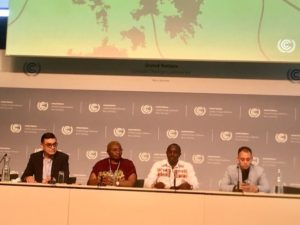 On 15th June 2022, WEP collaborated with PACJA to host a press conference where the group articulated its demands from the negotiations at Bonn Climate Change Conference and at COP27. Dr Priscilla Achakpa of WEP and Charles Mwangi of PACJA were some of the speakers at the press conference. The press conference explored what was needed in order to create balance and have adaptation, loss and damage, receive needed attention for resources and action.
On 15th June 2022, WEP collaborated with PACJA to host a press conference where the group articulated its demands from the negotiations at Bonn Climate Change Conference and at COP27. Dr Priscilla Achakpa of WEP and Charles Mwangi of PACJA were some of the speakers at the press conference. The press conference explored what was needed in order to create balance and have adaptation, loss and damage, receive needed attention for resources and action. - Climate Chance Press Conference:
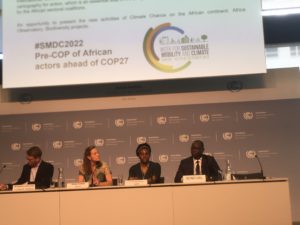 Our Executive Director, Anne-Marie Abaagu was one of the speakers at the press conference organized by Climate Chance on 15th June 2022 during the Bonn Climate Change Conference, where she spoke about what African women want from COP27 and how the Africa Climate Week will be used to mobilize action for COP27. She urged parties to develop and implement Gender Action Plans to address climate change crisis among vulnerable populations.
Our Executive Director, Anne-Marie Abaagu was one of the speakers at the press conference organized by Climate Chance on 15th June 2022 during the Bonn Climate Change Conference, where she spoke about what African women want from COP27 and how the Africa Climate Week will be used to mobilize action for COP27. She urged parties to develop and implement Gender Action Plans to address climate change crisis among vulnerable populations.
Actions
- Spotting G in GST: WEP joined other members of the Women and Gender Constituency to carry out a silent demonstration in front Addis Abeba plenary hall, where parties were set to meet.
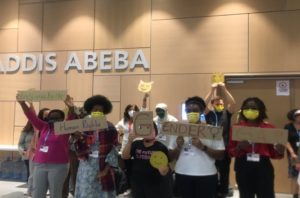 The Spotting G in GST action employed the use of arts and body movement to demonstrate to the Parties that gender matters across all aspects of global climate change talks: mitigation, adaptation, and finance. In carrying out the action, the actors tried to spot gender in mitigation, adaptation, and finance. This meant that issues of gender were not very well considered in these areas, hence the call from the women’s groups to the parties that gender matters in all aspects of the negotiations.
The Spotting G in GST action employed the use of arts and body movement to demonstrate to the Parties that gender matters across all aspects of global climate change talks: mitigation, adaptation, and finance. In carrying out the action, the actors tried to spot gender in mitigation, adaptation, and finance. This meant that issues of gender were not very well considered in these areas, hence the call from the women’s groups to the parties that gender matters in all aspects of the negotiations.
Articles and opinion pieces
As a way of projecting the demands of the African Women at SBI56, Women and Gender Constituency partnered with Climate Action Network (CAN) to write articles and opinion pieces about the issues that were discussed. CAN produces a newsletter about climate change negotiations and share around climate change conferences every day. John Baaki of WEP was one of the team members for Women and Gender Constituency who wrote articles and submitted to CAN. Three of the articles written and submitted to CAN were published.
One of the articles written by John Baaki was published by Environews. Read the article here.
SOME OF OUR RECOMMENDATIONS TO THE PARTIES DURING THE SBI56
In addition to the African Feminist Demands put forward by the Women and Gender Constituency which were used to engage the parties, WEP and other women’s groups put together some specific recommendations to the Parties based on issues that were discussed. Some of these recommendations bordered on the review of the implementation of the Gender Action Plan at SBI56, and the Nationally Determined Contributions (NDCs).
The following were the recommendations:
- The intermediate review of the Gender Action Plan should recognize and address the GAP activities where Parties can show greater ambition and commitment to implementation, more comprehensive understanding of gender interlinkages, and more consistent, robust, and tailored resourcing.
- Parties should recognize that the majority of NDCs continue to inadequately conceptualize, address, and integrate gender considerations as well as fail to commit to gender-responsive climate action with the scope, resources, and ambition necessary.
- Parties should also invite the financial mechanisms under the UNFCCC to improve the integration of gender into all project phases and increase accessibility for local groups and women organizations.
- Ensure that more action under the GAP focuses on building capacity initiatives and learning opportunities for the integration of gender into long term strategies towards economic diversification.
OUTCOME OF SBI56 INCLUDING SUCCESSES RECORDED FROM OUR ACTIVITIES
While a lot happened at Bonn Climate Change Conference, our focus was more on the issues that we set out to engage which were Loss and Damage, Gender and Climate Change and Climate Finance.
After two weeks of negotiations and of influence from observer organizations like ours, the conference closed with the following outcomes:
Gender and Climate Change: It was disappointing that there was no agreement on one negotiating text on Gender and Climate Change to take to Egypt. What stalled efforts to produce a common position at SBI56 was climate finance to implement the Gender Action Plan. One of the things that the Gender Action Plan advocated for was the establishment of the National Focal Points which most of the countries that are parties to UNFCCC have already established. But it is not enough to have the National Focal Points but to empower them to carry out assignments given to them.
Loss and Damage: Even with the clamor from women’s groups and other civil society organizations for a funding facility for Loss and Damage and for inclusion of this on the main COP27 agenda, the conference ended without this on the agenda due to disagreement between parties on this issue.
Other outcomes: Other recommendations made at the conference by the women’s groups and other civil society organizations may become visible at COP27
